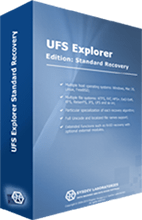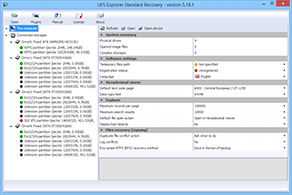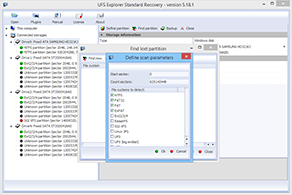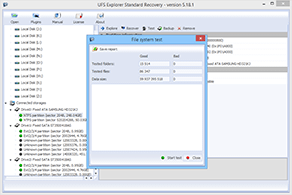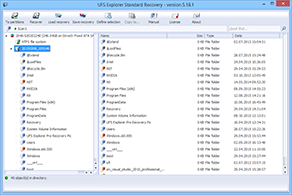
UFS Explorer Standard Recovery is a general data recovery tool that fits most of widespread logical data loss cases. This multi-purpose program allows recovering lost and accidentally deleted files from the majority of file systems. The software is adjusted to work with hard drives, external storages, disk images, virtual disks with equal efficiency. RAID-recovery is possible via plug-ins.
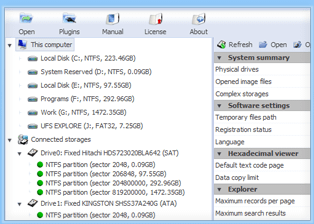
Key features
This program fits for data recovery from different devices and supports disk images and virtual machines – you can recover lost files from your PC, USB flash drive, memory card of your photo/video camera, external hard drive as well as a virtual machine or disk image file with one and the same tool. Besides, this application offers an option to import virtual .vim images from Runtime Software.
UFS Explorer Standard Recovery all in one supports recovery from a wide range of file systems – Windows (FAT/FAT32/ExFAT and NTFS); Apple macOS (HFS+); Linux (Ext2/Ext3/Ext4, ReiserFS, XFS, JFS (IBM JFS2) and FreeBSD (UFS/UFS2), custom Adaptec UFS, as well as access to files on Sun ZFS, Novell NWFS, Novell Storage Services file systems. Installable to Windows, Mac, Linux and BSD.
UFS Explorer Standard Recovery was designed to cover general data loss cases. Nevertheless, it provides a possibility to handle complex RAID storages. The RAID Builder tool is available in this program via additional plugin, which supports standard RAID configurations.
UFS Explorer Standard Recovery offers tool for viewing file data in hexadecimal mode. This allows analyzing file contents and defining the exact problem with a damaged file. This feature is especially helpful in pre-recovery examination of disk images and virtual disk files.
The utility is able to recover backups created with the Apple software Time Machine, a default backup application included with macOS. UFS Explorer Standard Recovery provides recovery of backups lost due to deletion of old backups, issues with the macOS version or the external disk error. With support of hard links the software provides complete recovery results.
The program allows conducting a pre-recovery file system test. First, the software estimates the overall file system consistency. Second, it defines the scope of damaged data for recovery. In case if a partition is lost, the program suggests special tools to find the lost partition or define the exact storage space from where it was lost.
NTFS, FAT/FAT32, exFAT;
XFS, Linux JFS, Ext2-Ext4, ReiserFS;
Apple HFS+;
UFS/UFS2, big-endian UFS;
NTFS:
full support: data access, search for lost partitions, RAID recovery, recovery of deleted files, recovery after formatting and file system damage.FAT/FAT32/exFAT:
full support: data access, search for lost partitions, recovery of deleted files, recovery after formatting and file system damage.XFS:
full support: data access, search for lost partitions, RAID recovery, recovery of deleted files, recovery after formatting and file system damage. Support of NAS devices and custom servers.Apple HFS+:
full support: data access, search for lost partitions, RAID recovery, recovery of deleted files*, recovery after file system damage.Linux JFS:
full support: data access, search for lost partitions, RAID recovery, recovery of deleted files, recovery after formatting and file system damage.Ext2-Ext4:
full support: data access, search for lost partitions, RAID recovery, recovery of deleted files*, recovery after file system damage. Support of both NAS and custom servers.ReiserFS:
full support: data access, search for lost partitions, RAID recovery, recovery of deleted files, recovery after formatting and file system damage.UFS/UFS2:
data access, search for lost partitions, RAID recovery for both little-endian and big-endian variations. Recovery after file system damage. Very limited recovery of deleted files.
Automatic reconstruction of mdadm, LVM, Apple Software RAID, Intel Matrix;
Supported are most popular standard RAID patterns for RAID0, RAID1E, RAID3, RAID5, RAID6, RAID7, etc.;
RAID-on-RAID support: RAID level 10, 50, 60, 50E, etc.;
Supported are custom RAID patterns via RDL or Runtime VIM.
The software will copy files with the size below 256 KB only;
"Save" function of certain hexadecimal viewer/editor dialogs is disabled.
Microsoft Windows ®: starting with Windows ® XP with Service Pack 3 and later;
macOS: all versions starting with 10.7 and above;
Linux: Debian Linux 6.0 (or compatible) and above.
Intel Architecture, 32-bit (IA-32, x86);
AMD64 (x86-64).
any of supported operating systems;
at least 20 MB of free space on the disk for software executable files;
at least 1 GB of RAM;
Linux software version can run from most modern Linux Live CD.
64-bit edition of any of supported operating systems;
over 1 GB of free space on the disk for the program and temporary files;
at least 2 GB of RAM and 4 logical cores CPU;
default web browser.
